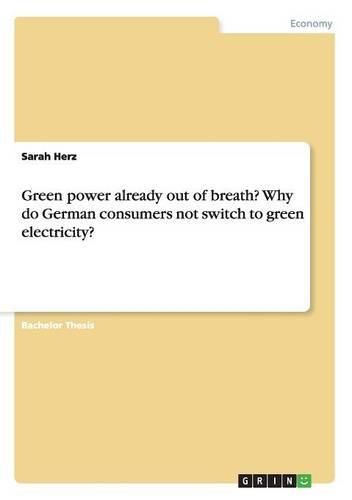Readings Newsletter
Become a Readings Member to make your shopping experience even easier.
Sign in or sign up for free!
You’re not far away from qualifying for FREE standard shipping within Australia
You’ve qualified for FREE standard shipping within Australia
The cart is loading…






Bachelor Thesis from the year 2011 in the subject Economy - Environment economics, grade: 1,7, University of Southern Denmark, language: English, abstract: The purpose of this paper is to provide a profound analysis of the motives for the non-switching behavior to green power vendors in Germany. While academic research provides many potential reasons, only a few have concentrated on internal and external influences on switching behavior as well as actual compliance with theoretical models. In this context, a survey has been undertaken in the Federal State of Mecklenburg-West-Pomerania to analyze the personal relevance of different motives for consumers. Furthermore, the survey also aimed at analyzing the compliance of theoretical criteria, provided by the Norm Activation Model and the Theory of Planned Behavior, in order to see whether respondents intent to switch after all. Therefore, the survey was distributed via the snowball system and has been completed by 115 respondents, providing data on 77 respondents who still consume conventional power. Though academic research has identified many potential motives for the switching inertia such as the lack of information, trust, and transparency in the electricity market, the survey at hand only confirmed one significant reason for non-switching. This reason relates to the consumers’ perception that green power is quantitatively not sufficient to supply the whole German electricity market.
$9.00 standard shipping within Australia
FREE standard shipping within Australia for orders over $100.00
Express & International shipping calculated at checkout
Bachelor Thesis from the year 2011 in the subject Economy - Environment economics, grade: 1,7, University of Southern Denmark, language: English, abstract: The purpose of this paper is to provide a profound analysis of the motives for the non-switching behavior to green power vendors in Germany. While academic research provides many potential reasons, only a few have concentrated on internal and external influences on switching behavior as well as actual compliance with theoretical models. In this context, a survey has been undertaken in the Federal State of Mecklenburg-West-Pomerania to analyze the personal relevance of different motives for consumers. Furthermore, the survey also aimed at analyzing the compliance of theoretical criteria, provided by the Norm Activation Model and the Theory of Planned Behavior, in order to see whether respondents intent to switch after all. Therefore, the survey was distributed via the snowball system and has been completed by 115 respondents, providing data on 77 respondents who still consume conventional power. Though academic research has identified many potential motives for the switching inertia such as the lack of information, trust, and transparency in the electricity market, the survey at hand only confirmed one significant reason for non-switching. This reason relates to the consumers’ perception that green power is quantitatively not sufficient to supply the whole German electricity market.